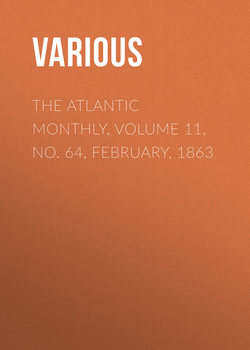Читать книгу The Atlantic Monthly, Volume 11, No. 64, February, 1863 - Various - Страница 5
UNDER THE PEAR-TREE
PART I
CHAPTER III
Оглавление"They du say Swan Day's gun off for good!" said Cely Temple, as she returned from the store, with a Dutch-oven in her hand, which she had purchased,—"an' to th' East Injees!"
"I want to know!" rejoined Mrs. Fox.
"I know some'll be sorry!" continued Cely, while Dorcas diligently stirred a five-pail kettle of apple-sauce, that hung stewing over the low fire.
Mrs. Fox looked up quickly at her daughter, but Dorcas continued quietly stirring, and without turning round.
"Mahala Dorr, I guess," said she.
"Wall, M'hala'll be, an' so'll others," answered Cely, prudently. "But I expect likely Swan'll do well, ef he don't die. They say the atemuspere is pison there!—especially for dark-complected folks."
To this hopeful remark Mrs. Fox rejoined, that "old Miss Day come herself from a warm country, and 't was likely her son would settle there for good, and enjoy his health there better than what he would here."
"He'll look out well for Number One, anyhow!" said Cely, lifting the lid of the Dutch-oven from the fire.
Dorcas shot an angry glance at the apple-sauce.
Nothing further passed on the subject, and Dorcas somehow felt, as she stirred, as if Swan were already a long, long way off,—as if the ship had sailed, and would stay sailed, like an enchanted ship, hovering on the horizon, and never come near enough for the passengers to be distinguished,—or else, maybe, go up into the clouds, and rest there with all its masts and spars distinct against the rose-mist, as she had read of once in a book of travels,—or, perhaps, even be inverted, and stand there on its head, as it were, always: but everything must be upside down, of course, in China. Already the thought of Swan Day had mingled with the mists of the past. The outline became indefinite, and softened into a golden splendor, that belonged no more to her, but was essentially of another hemisphere. He had by this time cut loose from home and country. Whether a hundred, or a hundred thousand miles, it mattered not. Since she could not grasp the idea, the distance was as good as infinite to her.
This, you see, is not exactly coquetry. But events drifted her.
When supper was over, and Dinah had gone to sleep, and Cely to visit the neighbors, as usual, Dorcas shyly approached the subject which occupied her thoughts, by getting the little box of jewelry, and looking at it. Her mother called her from the kitchen, out of which the bed-room opened.
"Does mother want me?" asked Dorcas, turning round, with the box in her hand.
"No, no matter," answered the mother; and, possibly with an intuitive feeling of what was in her daughter's thought, she went into the bed-room, and looked with her at the pin and ring of Aunt Dorcas.
"Was it—was it a long time, mother,—I mean, before he came back?" said Dorcas.
"Who? Captain Waterhouse? Bless you! they was as good as merried for ten year, an' he was goin' all the time, an' then, jest at the last minute, to be 'racked! It's 'most always so, when people goes to sea," added she, in a plaintive tone.
Dorcas meditated; she looked wistfully at her mother.
"It's a pretty pin,—dreadful pretty round the edge."
"Yes, 't is! I expect likely them's di'mon's. 'T was made over in foreign parts. He was goin' to bring his picter, too, from there. But he's lost and gone! Your Aunt Dorcas never had no more suitors after that, and she kind o' gin in, and never had no sperits."
